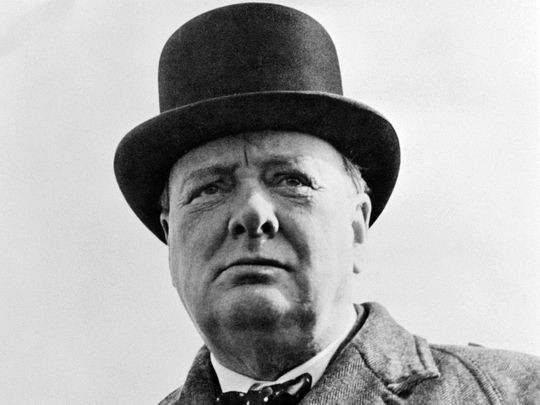
Warning to unrepentant Winston Churchill devotees: To what will be your complete dismay, yet another book was published recently written by yet another revisionist historian that does a pretty good hatchet job on Churchill.
The question we ask about who really was Winston Churchill and who was he not, what was his legacy and it was not, is perennial. It began even before his death in 1965 at age 90.
But it was only in recent years that revisionist scholarship, which claimed among its ranks historians, journalists, researchers and other social critics, began to present us with an alternate, less than flattering portrait of this once revered and towering figure, and only in recent months that demonstrators began to attack his statues in his own native land.
The new biography, Churchill’s Shadow: The Life and Afterlife of Winston Churchill, released in the US last month, is written by the prominent British journalist, author and historian Geoffrey Wheatcroft, who, as Churchill fans will tell you, critiques the Britain’s iconic hero.
A strategic bungler
In Wheatcroft’s telling, the man was not just a strategic bungler, a terrible judge of character and a terrible father, but in what we call in our politically correct times an outright racist.
Look, harsh as this assessment of Britain’s wartime leader may be, we have to recognise the fact that historians today consider revisionism, that is, the need to dig up new facts then re-examine, reinterpret and finally reckon with the past, a necessary function of their discipline.
This approach is seen as a given by the an overwhelming majority of the roughly 14,000 members of the American Historical Association, many of whom, in many a tome, have proffered “second opinions” on iconic figures in American history, ranging from Robert E. Lee to John F. Kennedy.
And well they might. The winds that define sense and sensibility, taste and fashion, in a culture are inconstant. Every generation judges anew. A future age may consider opinions we hold today, say on the merit of an art work or the legacy of a political leader, to be untenable, much in the manner that we consider what was considered revolutionary or avant-garde in a previous era reactionary or jejune.
No lasting validity
Revisionism may be an intellectual adventure of the contemporary mind, but revisionists will admit to you they are aware of the fact that their judgements have no lasting validity and that those judgements are made according to the present bent of their minds and the fabric of beliefs in their age — judgements that may be reversed tomorrow.
It is true that Churchill was possessed of all the character traits Wheatcroft, his new biographer, attributes to him. Arabs who are in touch with their modern history will tell you, for example, of how during the 1920 revolt by the people of Iraq against Britain’s colonial presence in their country, Churchill berated his colleagues for being “squeamish” about the use of gas there, claiming “I’m strongly in favour of using poison gas against uncivilised tribes”.
And those Indians who are equally in touch with their own modern history will tell you of the time in 1943 when Churchill callously refused to allow relief supplies to be shipped to to the people of Bengal — then part of India — struck by a famine that caused the death of well over a million people. saying that “they just have to tighten their belts”.
True, yes, but to be fair, all that can be explained, though by no means justified, by the fact that Winston Churchill was the product of his times, shaped by its view of the world, in a colonial era when the concept of the “white man’s burden” and “la mission civilizatrice” were fashionable — that is, when “the subjugated peoples” living in the colonies were seen as lower species of men and women. Today, people in Britain, who want to reckon with their past, are questioning the role that Churchill has played in it.
Across the Atlantic
However, Americans have continued to see Churchill’s life story — ever since he gave that 1945 cold-warrior Iron Curtain speech at Westminster College in Fulton, Missouri — as centred on a man who gave stirring speeches at a time of great peril to Britain, a time when fascism was about to have its day and democracy its eclipse in the Western world.
Churchill was a leader that American presidents, from Kennedy to Trump, claimed his mantle. Lest we forget, Ronald Reagan quoted him in his first inaugural speech and George W. Bush kept a bust of him in the Oval Office.
This is why books like Geoffrey Wheatcroft’s don’t go down well in the United States.
In an opinion piece in the Washington Post last week dismissing the British author’s efforts at revisionist history as bunk, the well known syndicated columnist Michael Gerson wrote: “At the most base level, a book such as Wheatcroft’s demonstrates the smallness of his frame and the largeness of his subject. The author comes off as a snide journalist fishing with a tiny ideological net”.
My! You can’t say I didn’t warn you about Churchill enthusiasts at the top of this column, folks who are relentless in rejecting judgements of their hero advanced by revisionist historians — even where those judgements are grounded on a wide range of knowledge and presented with persuasive clarity — and whose obduracy renders them, well, shall say, riddles wrapped in mysteries inside enigmas.
— Fawaz Turki is a journalist, academic and author based in Washington. He is the author of The Disinherited: Journal of a Palestinian Exile







